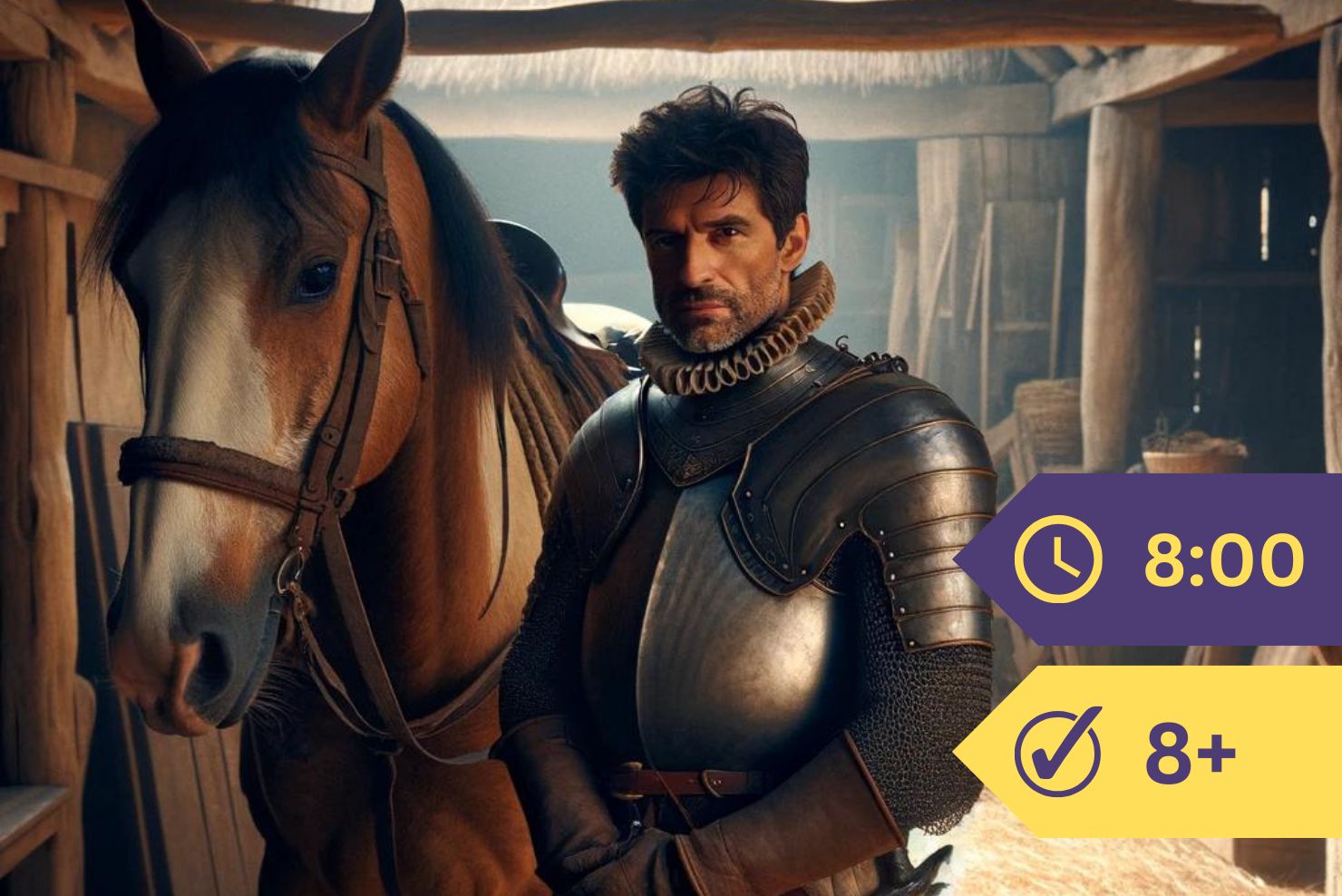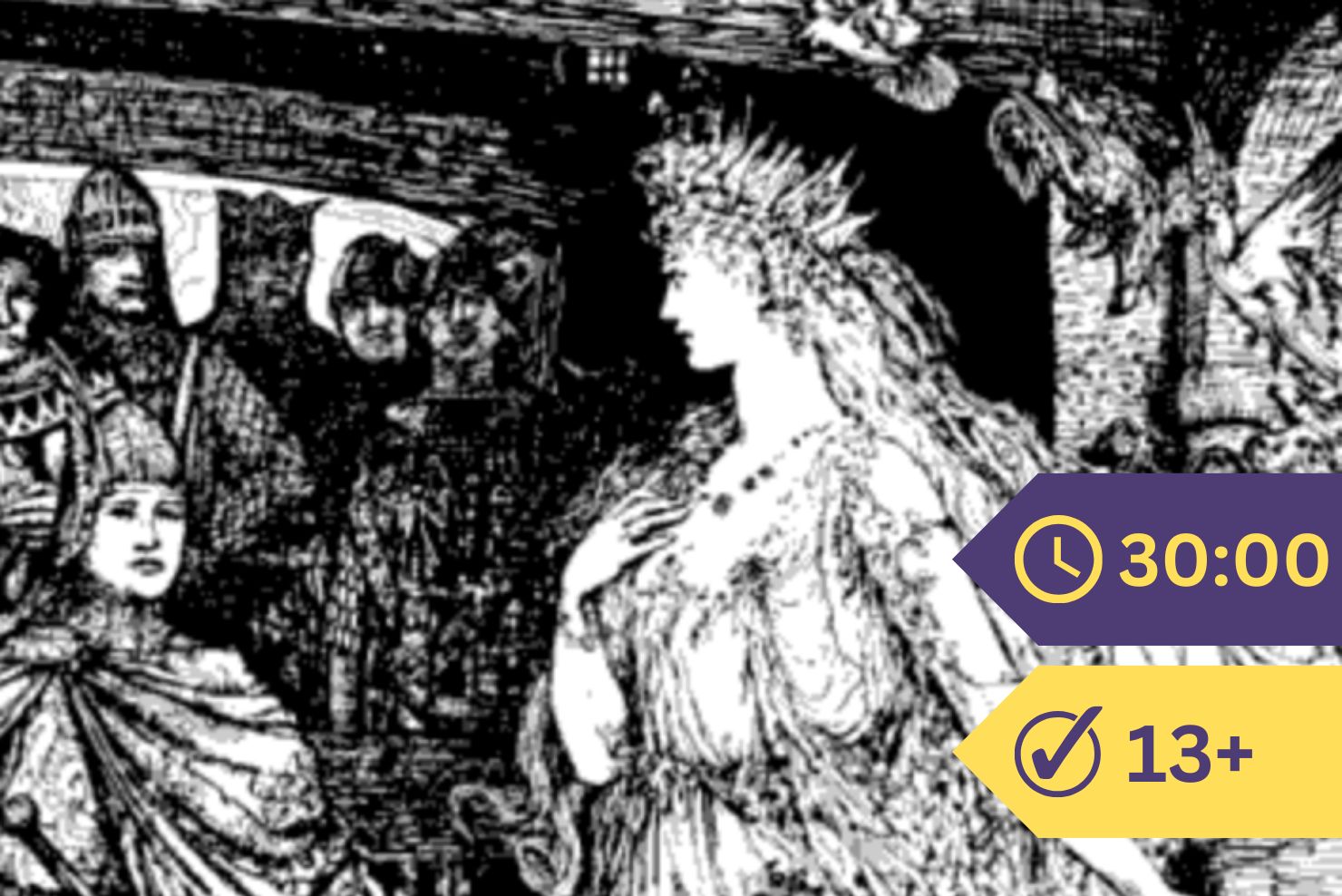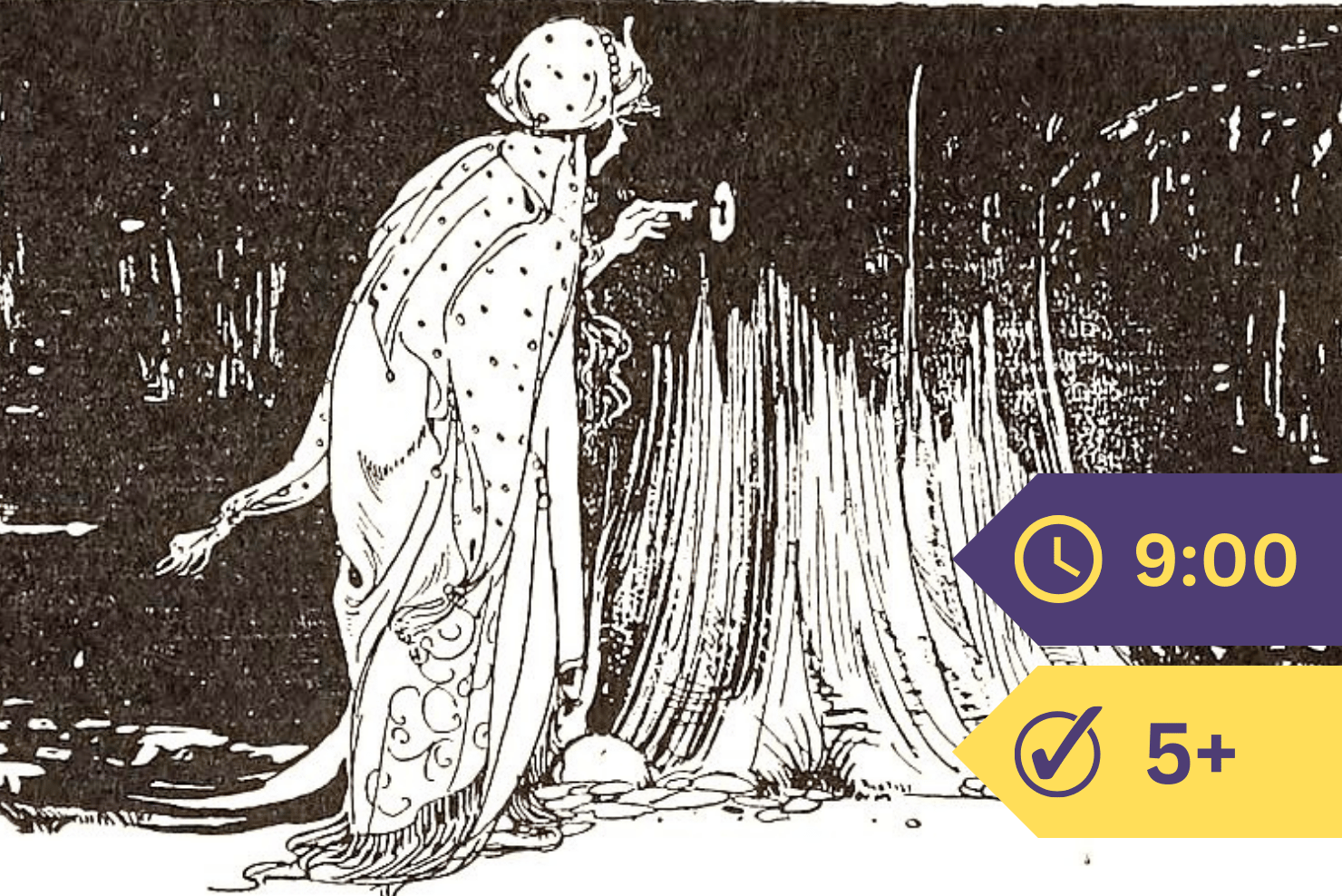There was now no heir to Thurston’s kingdom, since Harild and Berild were slain; and in a little time, when the king’s grief abated, he bethought him of what should befall his people when his time came to die.
“Cuthbert,” he said to Horn one day, when he had pondered long over these things, “there is no heir to my kingdom. There is but my daughter Reynild to come after me. Will you wed her, and he king and rule this land after my death?”
Horn was sorely tempted. But he looked on his ring, and remembered Rimenhild. “Sir king,” he answered, “you do me great honour, and I give you thanks. But I am under a vow, and cannot wed the lady Reynild.” He would say no more, but was firm in his purpose; and King Thurston had to be content with his loyal service only. For seven years Horn abode at Thurston’s court, serving in arms under him and winning great fame by his knightly deeds. No word did he send to Rimenhild, nor received tidings of any kind from Westerness.
About the end of the seventh year Horn chanced to be riding in the forest, when he met a page journeying as if towards Thurston’s palace. “What do you here?” he said. “Whither do you go?”
“Sir,” answered the page, “I have a message for one Sir Horn from Sir Athulf in Westerness, where Aylmer is king. The Lady Rimenhild is to be wedded on Sunday to King Modi of Reynes, and I am sent to bring tidings thereof to Sir Horn. But I can find him nowhere, nor hear even so much as his name, though I have wandered far and wide.”
At this heavy news Horn hid his name no longer. He told the page who he was, and bade him go back with all speed, and say to Rimenhild that she need no longer mourn: her lover would save her ere Sunday came.
The page returned blithely with this message. But he never delivered it, for as he went back he was by chance drowned; and Rimenhild, hearing no word of Horn, despaired. Athulf, too, watching long for Horn each day on a tower of Aylmer’s palace, gave up hope.
But Horn was not idle or forgetful. When he had despatched the page, as he thought, safely back to Athulf and Rimenhild, he went straight to King Thurston, and without more pretence told him his true name and all the story of the adventures.
“Sire,” he said, at the end, “I have served you well. Grant me reward for my service, and help me to win Rimenhild. See, you offered me the hand of your daughter Reynild; that I might not accept, for I was pledged already; but perchance my comrade Athulf might be deemed an honourable suitor. If you will but help me, Athulf shall be Reynild’s husband; that I vow. Sire, give me your aid.”
“Be it so,” said Thurston, loath to lose Horn, but glad to hear of a knight waiting to wed the lady Reynild. Straightway a levy of knights was made, and Horn set forth in a ship with a brave body of fighting men. The wind blew favourably, and ere long they came to Westerness. Even as they touched the shore, the bells ceased ringing for the marriage of Rimenhild to King Modi.
Horn saw how late they had arrived, and that he must needs act warily, if he would save Rimenhild in the midst of the rejoicings over her wedding. He left his men on board ship, and landed alone, setting out to walk to the palace, where the wedding-feast was about to be held. As he walked thus, he met a palmer [Footnote: A pilgrim], clad in pilgrim’s weeds. “Whither go you, sir palmer?” he asked.
“I have just come from a wedding,” he answered, “from the wedding of Rimenhild, the king’s daughter; and sad and sorrowful she seemed to be, in truth, on this wedding day.”
“Now Heaven help me, palmer, but I will change clothes with you. Take you my robe, and give me your long cloak. To-day I will drink at that wedding feast, and some shall rue the hour that I sit at the board with them.”
Without more ado he changed clothes with the palmer, taking also his staff and scrip, and staining his face till it was like that of a toil-worn traveller. Then he set out for the palace once more.
He came soon to the gates, where a porter strove to bar his entrance. But Horn broke in the wicket-gate, and entered, and threw the man over the drawbridge, so that his ribs were broken. None other stood in Horn’s way, and he went into the great hall, and took his place in a lowly seat among the beggars and poor men.
As he looked about him, he saw, at a little distance, Rimenhild, weeping and lamenting sorely. Athulf he did not see, for he was still keeping watch in the tower for Horn’s return. Before long Rimenhild rose from her seat and began to minister to the guests, according to custom, pouring them out wine and ale in horn beakers. When she came low down among the guests, Horn spoke to her.
“Fair queen,” he said, “serve us also; we beggars are athirst.”
She laid down the vessel she bore, and took a great gallon cup, and filled it with brown ale, and offered it him, thinking him a glutton. “Take this cup,” she said, “and drink your fill. Never saw I so forward a beggar.”
“I will not drink your ale, lady,” answered Horn, for he was minded to let her know who he was, and yet to hide himself from all others at the feast. “Give me wine; I am no beggar. I am a fisherman, come hither to search my nets, and see what I have caught. Pledge me now yourself and drink to Horn of horn.”
Thus by his strange words he thought to recall to her that dream she had formerly dreamed, of a great fish that escaped from her net.
Rimenhild looked on him, and hope and fear sprang up in her heart together. She knew not what his saying about his nets and “Horn of horn” might mean. With a steadfast look, she took her drinking-horn, and filled it with wine, and gave it to Horn.
“Drink your fill, friend,” she said, “and tell me if you have seen aught of this Horn of whom you seem to speak.”
Horn drained the beaker, and as he put it down dropped into it the ring that Rimenhild had given him so long ago. When Rimenhild saw the ring she knew it at once. She made an excuse, and left the feast, and went to her bower. In a little time she sent for the palmer secretly, and asked him where he got the ring.
“Queen,” said Horn, “in my travels I met one named Horn. He gave me this ring to bring to you; it was on shipboard I met him, and he lay dying.”
He said this to prove if her love were still constant to him. But Rimenhild believed him, and when she heard him say that Horn was dead, became as one mad with grief. Then Horn, seeing how strong was her love, threw off his palmer’s cloak, and showed her the false stain on his face, and told her that he was in very truth Horn, her lover.
When their first joy at meeting again was over, Horn told the princess of the men he had brought with him in his ship. Secretly they sent for Athulf, and when he too had learnt all Horn’s tidings, a message was sent to the men in the ship, who came to the palace speedily, and were admitted by a private door. Then all the company of them broke suddenly into the banquet-hall, and fell upon those there, and slew many; but Modi and Fikenhild escaped and fled from Westerness.






